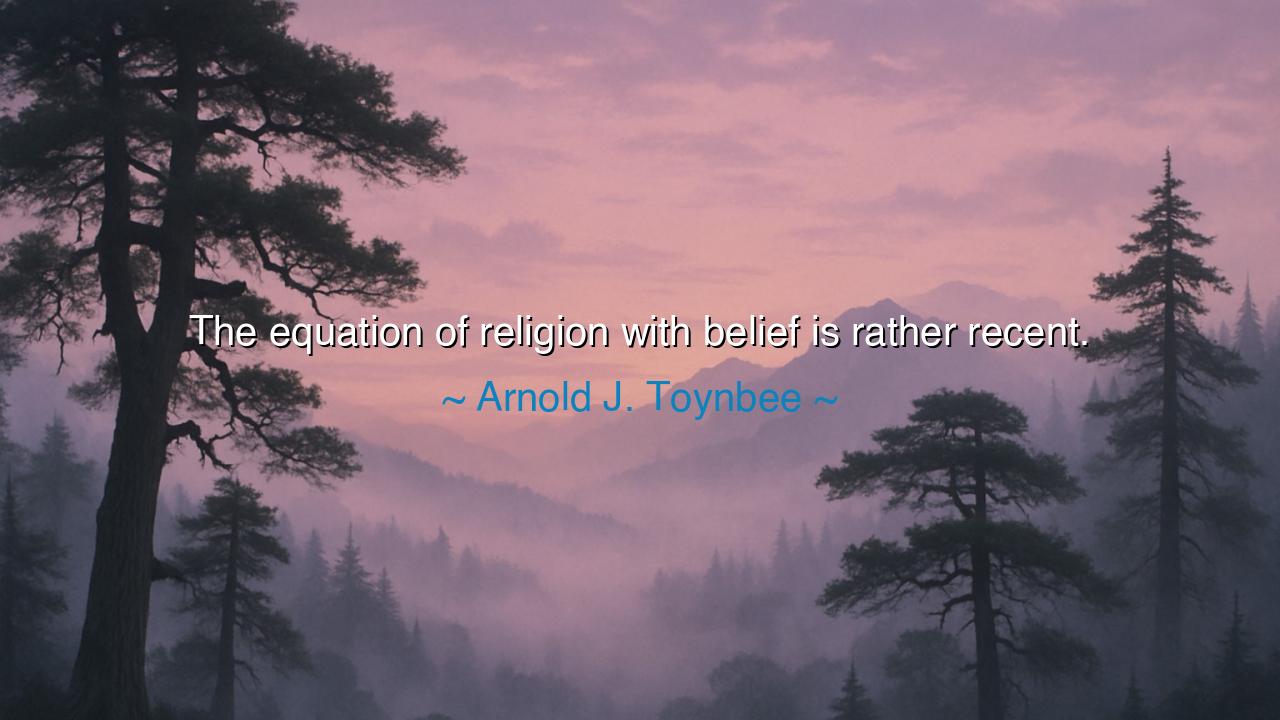
The equation of religion with belief is rather recent.






Hear, O seekers of wisdom, the words of Arnold J. Toynbee, historian of civilizations and chronicler of the rise and fall of nations: “The equation of religion with belief is rather recent.” In this saying, he reminds us that what men call religion has not always been what we moderns think it to be. Today, many equate religion with doctrines, with systems of belief, with creeds to which the mind must give assent. But in the ancient world, religion was not only belief—it was ritual, it was community, it was the bond between man and the mysteries of nature, life, and death.
For in the earliest ages, religion was not about subscribing to abstract truths, but about living in harmony with the sacred. The Greeks did not speak of “believing” in Zeus; they honored him in temples, festivals, and sacrifices. The Romans did not demand that citizens affirm a creed, but that they participate in rites that bound the empire together. In Egypt, the mysteries of Osiris and Ra were not primarily systems of thought, but acts of devotion, rituals of death and rebirth. Belief as we now understand it—mental assent to doctrine—was a later emphasis, sharpened especially by the Abrahamic traditions, and even more so by the struggles of early Christianity, which sought to distinguish true faith from heresy.
Toynbee’s insight reveals how history shapes the meaning of religion. In the Middle Ages, Christianity in Europe became deeply tied to belief: to hold the “right” creed was essential for salvation. Those who disagreed were branded heretics, often exiled or slain. This emphasis on belief, carried into modernity, led many to forget that religion in its origins was broader, encompassing not only faith in doctrines but participation in practices, moral duties, and communal bonds. The narrowing of religion into “belief alone” is thus, as Toynbee says, a recent equation, not an eternal truth.
Consider the story of the Emperor Constantine, who in the fourth century embraced Christianity. For him, religion was both practice and politics—rituals that could unify his empire, symbols that could give divine legitimacy to his rule. Yet in the centuries that followed, councils were convened to define belief: the Nicene Creed, the Chalcedonian formula, declarations of orthodoxy. From then onward, religion in the Christian West became more and more equated with what one believed, rather than simply how one lived or worshiped. Here we see the transformation Toynbee describes, from religion as a way of life to religion as a set of doctrines.
But let us not forget the religions of the East, where the essence was often practice more than belief. In Buddhism, the focus is not on affirming a creed, but on walking the Eightfold Path, on meditation, on compassion. In Confucianism, religion is a matter of ritual propriety, filial duty, and social harmony, not abstract doctrine. These traditions remind us that the modern Western idea of equating religion with belief is not universal, but indeed a historical development, recent in the long journey of humanity.
The lesson is this: do not reduce religion to belief alone. It is more than words in a creed, more than doctrines of the mind. It is practice, community, compassion, reverence, and transformation. To truly understand religion—whether your own or that of another—you must see beyond belief into the living heart of it: the rituals that bind, the virtues that guide, the sense of awe that humbles the human spirit before the infinite.
So I say to you, children of the future: remember Toynbee’s wisdom. Do not judge a religion solely by what it claims in doctrine, nor dismiss another because its beliefs differ from your own. Look deeper—ask how it shapes lives, how it uplifts, how it binds communities together, how it gives meaning to suffering and strength in joy. For belief is but one thread in the great tapestry of faith. To see the whole cloth, you must behold religion as life itself: practice and poetry, ritual and reverence, creed and compassion, all woven into one.






AAdministratorAdministrator
Welcome, honored guests. Please leave a comment, we will respond soon